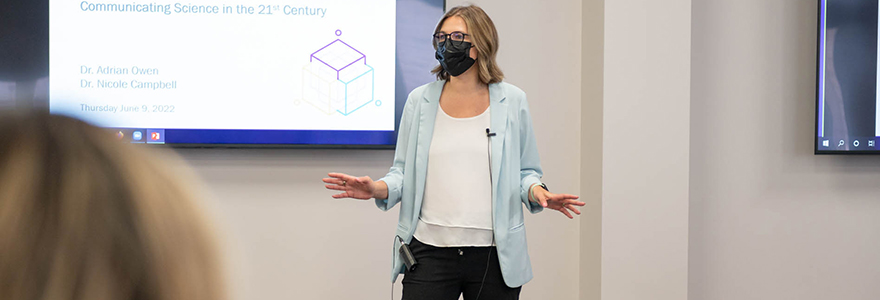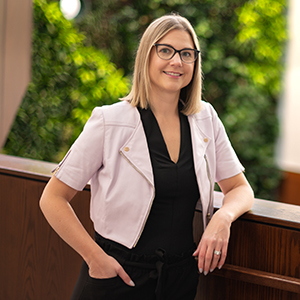Dr. Nicole Campbell and the creativity of teaching

By Cam Buchan
From a sessional instructor travelling Highway 401, to re-imagining the way teachers connect with students, Dr. Nicole Campbell has brought experience and creativity to her classrooms.
Now the associate professor, Department of Physiology and Pharmacology, and Director, Interdisciplinary Medical Sciences, at Schulich School of Medicine & Dentistry, has received the Ontario Confederation of University Faculty Associations (OCUFA) award, recognizing her teaching abilities and her care and concern for students.
“Nicole is a tremendous leader in our undergraduate and graduate programs in Interdisciplinary Medical Sciences,” said Brad Urquhart, Associate Dean, Basic Medical Sciences Undergraduate Education. “Her thoughtful incorporation of skills into these programs drives the success of her students beyond the classroom. In the classroom, she’s a caring professor who uses creative activities to engage her students. We’re so proud that Nicole’s hard work and dedication to her students has been recognized with such a prestigious award.”
In this Q&A, Campbell gives us some insights into her teaching philosophy and approach.
Why does teaching interest you so much?
I have fond memories of incredible people who educated and mentored me throughout my life. It is such a privilege to now be in a position to do that for the next generation.

Tell us about your journey to Schulich Medicine
When I finished my PhD, I was a sessional instructor working at several institutions for almost three years. Every day I was on (Highway) 401, and it was a really difficult time. Before I got my job here, I enrolled in the Professional Masters of Education at Queens University. Almost the next day, I was offered a job here to teach in the undergraduate Interdisciplinary Medical Sciences (IMS) program. From day one at Schulich, my colleagues in the Department of Physiology and Pharmacology welcomed me. It was an amazing environment.
Why is creativity important in teaching?
I never saw teaching as a creative profession. But that's the part I love about it now. It requires so much creativity because each learner will need a unique explanation or supports to understand concepts. I love to solve complex problems with creative solutions and my job lets me do that everyday.
When did you understand the challenges students face?
The moment I started to see the challenges students face was when I did my Masters in 2015. I had just started my role here, my husband was still in Toronto, I had two young kids. I wasn't even living in London. I wanted to do well, but I wasn't trying to get into medical school or graduate school like my students. Yet I felt lost. That program allowed me to experience things through students’ eyes, and realize that it was stressful. That’s when I realized I wanted to change things.
What are some highlights of your educational experience at Schulich?
When eCampus Ontario put out a call for proposals in 2020, I rallied experts from colleges and universities across Ontario to build an open-source curriculum incorporating aspects of executive function, communication skills, critical thinking, and intra- and inter-personals skills that could be added to a teacher’s curriculum. The result was “Uncovering the Hidden Curriculum,” a project to help educators support students within and beyond education. I am really proud of how the project came together. We are now thinking about ways that we can expand this project and try to have a broader reach on campus and beyond.
Describe your educational philosophy
Over the years, I realized the value in creating an environment where students learn from me, they learn from one another, and I learn from them. Creating this type of educational ecosystem meant that I prioritized teaching as a human experience and fostered professional relationships founded on trust and respect. To accomplish this, I invest time and resources into getting to know my students every year. Prioritizing student mental health within the classroom signals a pedagogy of care, which I believe allows my learners to thrive. This approach has brought so much meaning to my teaching career and I am on a mission to share it with others so that they can experience what I have had the privilege of feeling.
What brings you the most joy as an educator?
Recently, a former student called to ask my advice about the direction to take in his graduate program, and I was so excited to connect with him again. For me, the best feeling as an educator is when students follow up to share their journey accomplishments and also to say thank you for the learning environment you provided.








